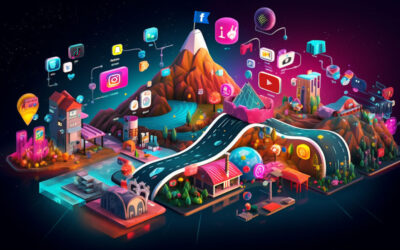Embarking on a captivating odyssey that traverses generations, the trajectory of video games unfolds as a riveting narrative. Once confined to a niche realm enjoyed by a select few, video games have metamorphosed into a colossal cultural phenomenon, defying traditional constraints and embracing diverse platforms like esports, game streaming, and virtual reality. In this exploration, we plunge into the enthralling evolution of video game culture, bearing witness to its transformation into the colossal industry that captivates us today.
The Inceptive Pixels: A Journey from Humble Origins to Popularity Peaks
In the mid-20th century, video games took their initial steps, adorned with simple graphics and basic gameplay. Initially regarded as a novel form of amusement, they found a haven among young gamers and tech enthusiasts. The rudimentary charm of early classics like Pong and Space Invaders laid the bedrock for what would burgeon into a monumental industry.
The 1980s heralded a significant upswing in the popularity of arcade games and home consoles. Iconic titles such as Pac-Man and Super Mario Bros. soared as cultural phenomena, cementing gaming as an adored pastime. Nevertheless, the stereotype of video games being a domain solely for kids or “geeks” endured.
The Paradigm-Shifted 90s
The 1990s ushered in pivotal changes for video game culture. The advent of consoles like the Super Nintendo and Sega Genesis provided more intricate gameplay experiences. Games like The Legend of Zelda: Ocarina of Time and Final Fantasy VII found an audience that spanned all ages.
The late ’90s witnessed the dawn of the internet, reshaping gaming. Multiplayer online games like EverQuest and Ultima Online paved the way for the colossal online gaming communities we witness today. LAN parties and internet cafes emerged as crucibles, solidifying the social fabric of gaming.
The 21st Century Alchemy
The 21st century marked a resounding transformation for video game culture. Technological leaps ushered in improved graphics, immersive storytelling, and gameplay complexities. Titles such as Halo, World of Warcraft, and Grand Theft Auto mesmerized diverse audiences.
Esports emerged as a mainstream spectacle, with games like League of Legends and Counter-Strike: Global Offensive amassing colossal audiences. Esports events became grand spectacles, offering millions in prize money.
The Rise of the Streaming Titans
Game streaming platforms, with Twitch at the forefront, revolutionized the sharing of gaming experiences. Streaming personalities evolved into celebrities, drawing millions to witness live gameplay, commentaries, and interactions. Streaming fostered a sense of community and interaction among players and viewers.
Virtual Reality’s Extra Dimension
Virtual Reality (VR) introduced an extra dimension to gaming, enabling players to immerse themselves in fantastical virtual realms. Beyond the gaming sphere, VR extended its reach into arenas like virtual tourism and immersive training simulations.
The Epoch of Mainstream Acceptance
Today, video game culture transcends the mere mainstream; it stands as an integral pillar of global entertainment. Gaming has broken free from age, gender, and background constraints, fostering a diverse community of players and enthusiasts.
Video games are no longer confined to mere entertainment; they stand as a testament to artistic expression. Titles such as Journey, Celeste, and The Last of Us have been heralded for their emotional depth and storytelling prowess. The gaming industry continues its ceaseless journey of pushing boundaries and challenging conventions.
The metamorphosis of video game culture from a niche pursuit to a mainstream marvel attests to the industry’s resilience and innovation. With technological strides, the ascent of esports, game streaming, and the immersive realm of virtual reality, video games have become woven into the very fabric of our cultural tapestry. Gazing into the future, it’s discernible that video games will persist in pushing boundaries, uniting communities, and fundamentally reshaping our understanding of entertainment. The odyssey from niche to mainstream is not merely a cultural evolution; it is a spellbinding transformation of an art form, one that leaves an indelible mark on the generations that follow.








